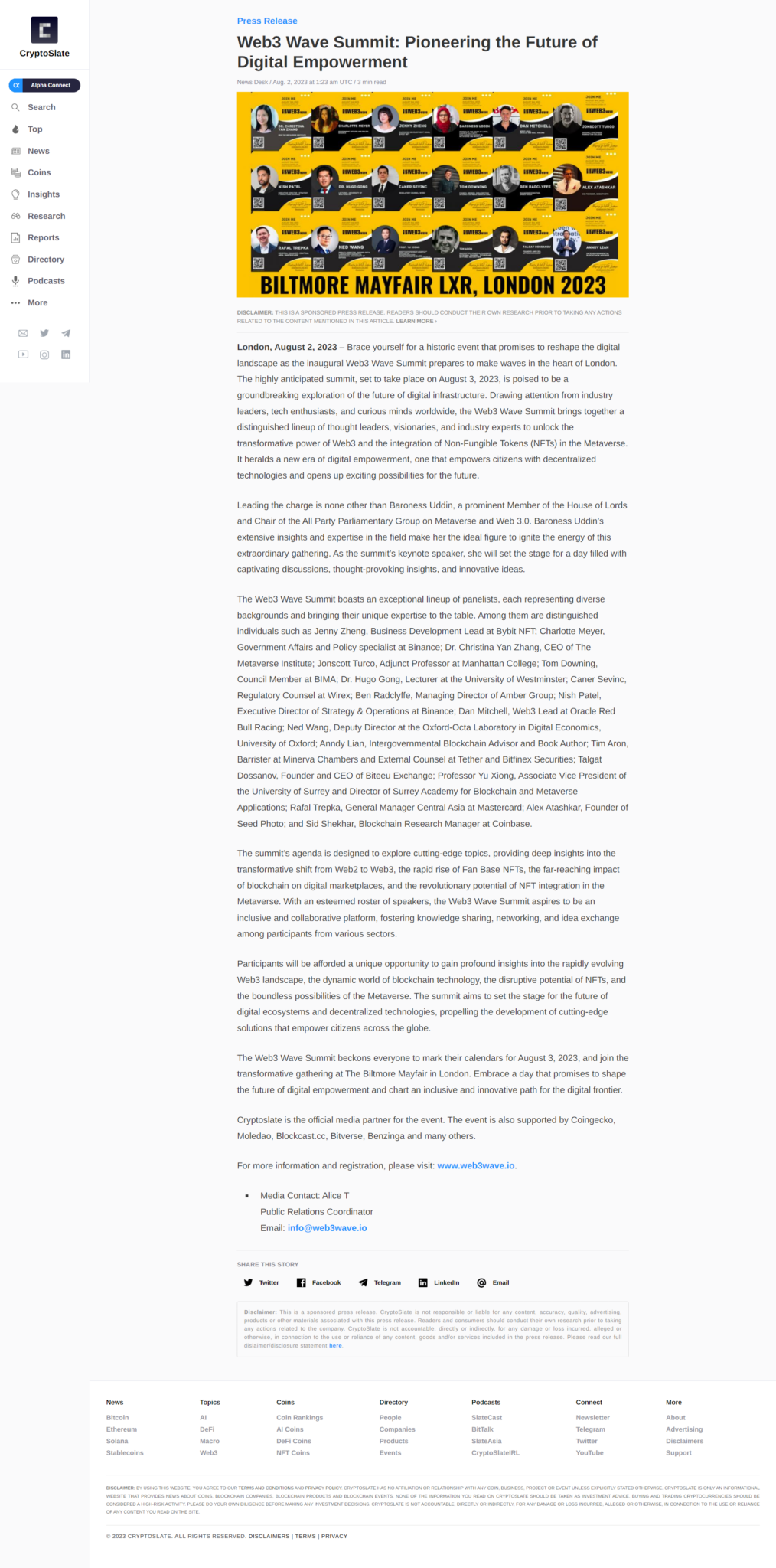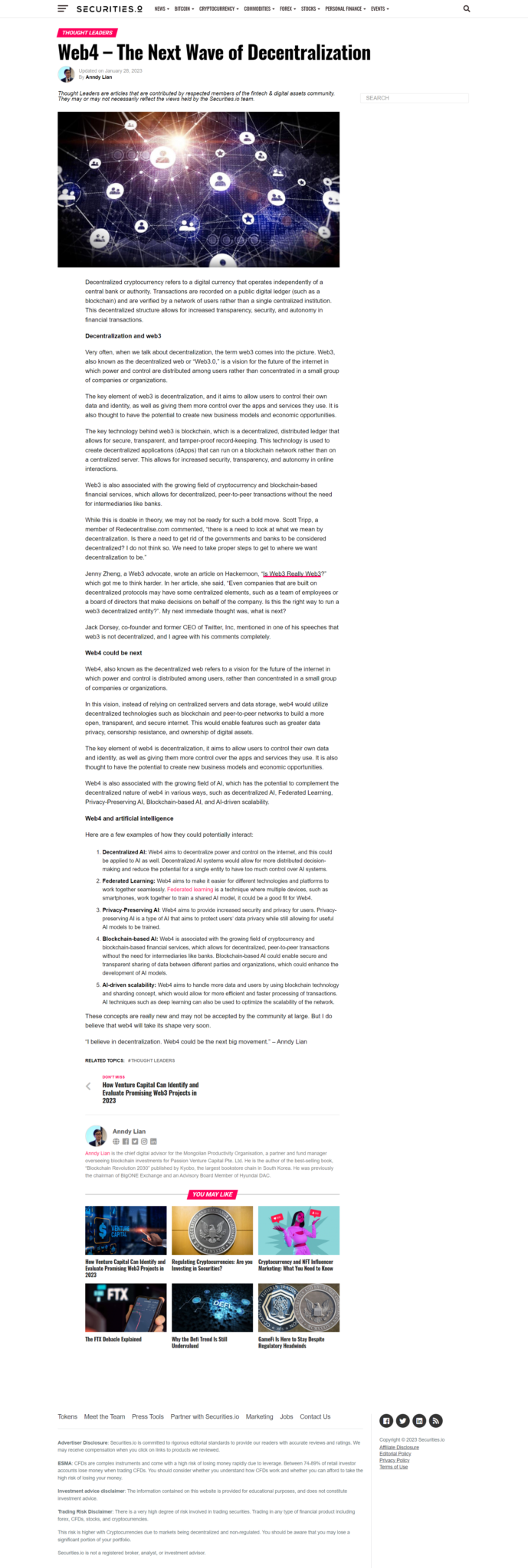London, August 2, 2023 – Brace yourself for a historic event that promises to reshape the digital landscape as the inaugural Web3 Wave Summit prepares to make waves in the heart of London. The highly anticipated summit, set to take place on August 3, 2023, is poised to be a groundbreaking exploration of the future of digital infrastructure. Drawing attention from industry leaders, tech enthusiasts, and curious minds worldwide, the Web3 Wave Summit brings together a distinguished lineup of thought leaders, visionaries, and industry experts to unlock the transformative power of Web3 and the integration of Non-Fungible Tokens (NFTs) in the Metaverse. It heralds a new era of digital empowerment, one that empowers citizens with decentralized technologies and opens up exciting possibilities for the future.
Leading the charge is none other than Baroness Uddin, a prominent Member of the House of Lords and Chair of the All Party Parliamentary Group on Metaverse and Web 3.0. Baroness Uddin’s extensive insights and expertise in the field make her the ideal figure to ignite the energy of this extraordinary gathering. As the summit’s keynote speaker, she will set the stage for a day filled with captivating discussions, thought-provoking insights, and innovative ideas.
The Web3 Wave Summit boasts an exceptional lineup of panelists, each representing diverse backgrounds and bringing their unique expertise to the table. Among them are distinguished individuals such as Jenny Zheng, Business Development Lead at Bybit NFT; Charlotte Meyer, Government Affairs and Policy specialist at Binance; Dr. Christina Yan Zhang, CEO of The Metaverse Institute; Jonscott Turco, Adjunct Professor at Manhattan College; Tom Downing, Council Member at BIMA; Dr. Hugo Gong, Lecturer at the University of Westminster; Caner Sevinc, Regulatory Counsel at Wirex; Ben Radclyffe, Managing Director of Amber Group; Nish Patel, Executive Director of Strategy & Operations at Binance; Dan Mitchell, Web3 Lead at Oracle Red Bull Racing; Ned Wang, Deputy Director at the Oxford-Octa Laboratory in Digital Economics, University of Oxford; Anndy Lian, Intergovernmental Blockchain Advisor and Book Author; Tim Aron, Barrister at Minerva Chambers and External Counsel at Tether and Bitfinex Securities; Talgat Dossanov, Founder and CEO of Biteeu Exchange; Professor Yu Xiong, Associate Vice President of the University of Surrey and Director of Surrey Academy for Blockchain and Metaverse Applications; Rafal Trepka, General Manager Central Asia at Mastercard; Alex Atashkar, Founder of Seed Photo; and Sid Shekhar, Blockchain Research Manager at Coinbase.
The summit’s agenda is designed to explore cutting-edge topics, providing deep insights into the transformative shift from Web2 to Web3, the rapid rise of Fan Base NFTs, the far-reaching impact of blockchain on digital marketplaces, and the revolutionary potential of NFT integration in the Metaverse. With an esteemed roster of speakers, the Web3 Wave Summit aspires to be an inclusive and collaborative platform, fostering knowledge sharing, networking, and idea exchange among participants from various sectors.
Participants will be afforded a unique opportunity to gain profound insights into the rapidly evolving Web3 landscape, the dynamic world of blockchain technology, the disruptive potential of NFTs, and the boundless possibilities of the Metaverse. The summit aims to set the stage for the future of digital ecosystems and decentralized technologies, propelling the development of cutting-edge solutions that empower citizens across the globe.
The Web3 Wave Summit beckons everyone to mark their calendars for August 3, 2023, and join the transformative gathering at The Biltmore Mayfair in London. Embrace a day that promises to shape the future of digital empowerment and chart an inclusive and innovative path for the digital frontier.
Cryptoslate is the official media partner for the event. The event is also supported by Coingecko, Moledao, Blockcast.cc, Bitverse, Benzinga and many others.
For more information and registration, please visit: www.web3wave.io.


Anndy Lian is an early blockchain adopter and experienced serial entrepreneur who is known for his work in the government sector. He is a best selling book author- “NFT: From Zero to Hero” and “Blockchain Revolution 2030”.
Currently, he is appointed as the Chief Digital Advisor at Mongolia Productivity Organization, championing national digitization. Prior to his current appointments, he was the Chairman of BigONE Exchange, a global top 30 ranked crypto spot exchange and was also the Advisory Board Member for Hyundai DAC, the blockchain arm of South Korea’s largest car manufacturer Hyundai Motor Group. Lian played a pivotal role as the Blockchain Advisor for Asian Productivity Organisation (APO), an intergovernmental organization committed to improving productivity in the Asia-Pacific region.
An avid supporter of incubating start-ups, Anndy has also been a private investor for the past eight years. With a growth investment mindset, Anndy strategically demonstrates this in the companies he chooses to be involved with. He believes that what he is doing through blockchain technology currently will revolutionise and redefine traditional businesses. He also believes that the blockchain industry has to be “redecentralised”.


